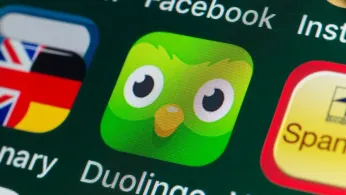
3 hours ago
Duolingo Issues Apology to J.K. Rowling After German Lesson Labels Author "Cruel"
READ TIME: 3 MIN.
Duolingo has come under public scrutiny after users discovered a German language lesson containing a prompt about the Harry Potter series and its author, J.K. Rowling. The lesson asked: “Magst du die Bücher mit Harry Potter als Figur?” (“Do you like books with Harry Potter as a character?”), to which the correct answer was “Ja, aber meiner Meinung nach ist die Autorin gemein”—translating to, “Yes, but in my opinion the author is cruel/mean” . The phrasing quickly drew criticism on social media, with users questioning both the appropriateness and the intent behind the inclusion of such a value-laden statement in a language lesson .
In response to the backlash, Duolingo issued a public apology, stating: “We apologise for any offence caused and will remove this content from the app” . The company confirmed the removal of the exercise and clarified that the prompt did not reference Rowling’s views on transgender people or broader LGBTQ+ issues directly .
J.K. Rowling has remained a divisive figure, particularly among transgender people and LGBTQ+ advocates, following several public statements that have been widely criticized as transphobic. Many within these communities view her comments as harmful and exclusionary, leading to calls for boycotts and public condemnation from various organizations . For some, the inclusion of a negative characterization of Rowling in a Duolingo lesson reflected their own frustrations with her public stance.
However, LGBTQ+ voices also highlight the importance of responsible representation and the risks of oversimplifying complex issues. Critics of the Duolingo prompt argued that using the word “cruel” in a language exercise could perpetuate hostility rather than foster understanding, and that educational platforms should carefully consider the impact of their content on diverse communities .
The swift apology from Duolingo demonstrates a growing awareness among tech companies of their responsibilities in cultural and political discourse. The company stated that its courses often include debate prompts or controversial opinions to help users learn how to express disagreement in another language. For example, other lessons may require users to discuss the fundamentals of democratic society, regardless of personal opinion .
Yet, Duolingo’s decision to remove the Rowling prompt and issue a public apology underscores the need for sensitivity, especially when issues intersect with marginalized identities. The company’s spokesperson emphasized that content is regularly reviewed to align with community standards and avoid unnecessary offense .
For many LGBTQ+ users, the incident is emblematic of ongoing challenges around representation in digital education. Some have expressed disappointment that Duolingo’s apology did not acknowledge the pain Rowling’s statements have caused transgender people and the wider LGBTQ+ community . Others argue that platforms like Duolingo must strike a balance between fostering open dialogue and ensuring that marginalized voices are respected and protected.
The episode also raises broader questions about how language apps can meaningfully address social issues without resorting to simplistic or divisive characterizations. LGBTQ+ advocates have called for greater inclusion in curriculum development, suggesting that diverse teams can help anticipate and mitigate potential harm .
As language learning apps increasingly incorporate real-world scenarios and debate topics, the Duolingo incident highlights the importance of intentional and inclusive content design. The company’s willingness to listen and respond to user feedback may set a precedent for other platforms navigating cultural sensitivities and the complexities of representation.
Ultimately, while Duolingo’s apology addressed immediate concerns, the event has catalyzed wider discussions about the intersection of technology, education, and LGBTQ+ advocacy. As digital spaces continue to evolve, the voices and experiences of transgender people and the broader LGBTQ+ community remain essential to building inclusive, respectful environments for all learners.






